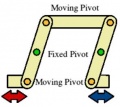Linkages: Difference between revisions
From DT Online
Added category link |
mNo edit summary |
||
| (9 intermediate revisions by the same user not shown) | |||
| Line 1: | Line 1: | ||
[[File:IHsunday.jpg|400px|right|]] | |||
__TOC__ | |||
=====Description===== | |||
A '''linkage''' is a '''[[:Category:Mechanisms|mechanism]]''' made by connecting together rigid links or '''[[Class of Lever|levers]]'''. | |||
=====Features and Applications===== | |||
Levers or links may be connected together using a wide range of fastenings which allow free movement - e.g. [https://en.wikipedia.org/wiki/Screw screws], [https://en.wikipedia.org/wiki/Split_pin split pins], [https://en.wikipedia.org/wiki/Brass_fastener paper fasteners], [https://en.wikipedia.org/wiki/Rivet#Blind_rivets pop rivets], [https://en.wikipedia.org/wiki/Clevis_fastener clevis pins], [https://en.wikipedia.org/wiki/Nut_%28hardware%29 nuts and bolts], etc. The linkage can be made to change the magnitude or direction of a force or make two or more things move at the same time - or they can be used to amplify movement. | |||
Linkages which makes things move in opposite directions may be called '''[[Reverse Motion Linkage|Reverse Motion Linkages]]''' and linkages which makes the output move in the same direction as the input may be called '''[[Push-Pull Linkage|Push-Pull Linkages]]'''. | |||
As with other mechanisms, the '''[[Mechanical Advantage]]''' of a linkage is calculated by dividing the force generated at the output ''(load)'' by the input force ''(effort)''. The '''[[Velocity Ratio]]''' is given by dividing the distance moved at the input by the distance moved at the output of the linkage. In an ideal friction free world, these two values would be equal but this is most unlikely to be so in the case of complex linkages with their many opportunities for loss of energy, if the joints are too tight, or of movement if they are too loose. | |||
---- | |||
[[Category:Primary]] | |||
[[Category:Secondary]] | |||
[[Category:Mechanisms]] | [[Category:Mechanisms]] | ||
Latest revision as of 08:39, 8 July 2017

Description
A linkage is a mechanism made by connecting together rigid links or levers.
Features and Applications
Levers or links may be connected together using a wide range of fastenings which allow free movement - e.g. screws, split pins, paper fasteners, pop rivets, clevis pins, nuts and bolts, etc. The linkage can be made to change the magnitude or direction of a force or make two or more things move at the same time - or they can be used to amplify movement.
Linkages which makes things move in opposite directions may be called Reverse Motion Linkages and linkages which makes the output move in the same direction as the input may be called Push-Pull Linkages.
As with other mechanisms, the Mechanical Advantage of a linkage is calculated by dividing the force generated at the output (load) by the input force (effort). The Velocity Ratio is given by dividing the distance moved at the input by the distance moved at the output of the linkage. In an ideal friction free world, these two values would be equal but this is most unlikely to be so in the case of complex linkages with their many opportunities for loss of energy, if the joints are too tight, or of movement if they are too loose.
Pages in category "Linkages"
The following 5 pages are in this category, out of 5 total.
Media in category "Linkages"
The following 6 files are in this category, out of 6 total.
-
4BarChain.jpg 322 × 189; 10 KB
-
FourBarChain.png 322 × 189; 8 KB
-
MechanismsBellCrank.jpg 265 × 246; 10 KB
-
MechanismsParallelMotionLinkage.jpg 300 × 227; 10 KB
-
MechanismsPushPullLinkage.jpg 296 × 265; 13 KB
-
MechanismsReverseMotionLinkage.jpg 299 × 208; 10 KB





